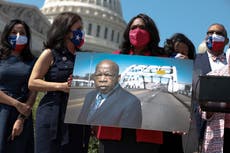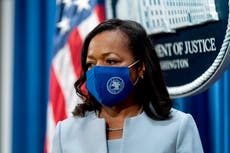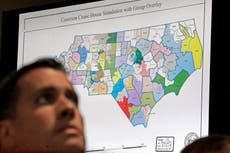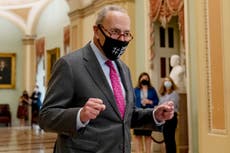2021 March on Washington to cap summer of voting rights protests with biggest rallies yet
Demonstrations in nation’s capital and across US demand federal action to protect voting rights
The 2020 March on Washington followed a summer of uprisings against police violence and racism, steering towards a presidential election and efforts from the White House to undermine the votes of millions of Americans.
This year, the event – expected to draw massive crowds in Washington DC – arrives on the heels of a summer of protests organised by Black activists to protect the right to vote against a GOP campaign to subvert elections and restrict access to the ballot.
Marking 58 years after Martin Luther King Jr delivered his “I have a dream” remarks at the steps of the Washington Monument, the 2021 March on Washington on 28 August includes a series of nationwide events under the March on for Voting Rights banner, from the nation’s capital to Atlanta, Miami, Houston and Phoenix, with nearly 50 other events staged in other cities.
The nationwide demonstrations on 28 August follow a summer of protests – mostly led by Black organisers – from outside the Capitol and on the steps of the Supreme Court to traveling caravans across the US South that echoed the Freedom Summer Project of 1964, when voting rights advocates mobilised across southern states to register disenfranchised people to vote.
Among the speakers are the Rev Al Sharpton, members of the Congressional Black Caucus, civil rights attorneys, and the Rev William Barber of the Poor People’s Campaign, which has organised protests for voting rights as well as support for a $15 minimum wage in recent months.
This year, demonstrations call on Congress to pass a pair of voting rights bills – the For The People Act and the John Lewis Voting Rights Advancement Act, both of which secured passage in the House of Representatives but face a Republican blockade in the US Senate.
This year’s March on Washington is the second since the death of US Rep John Lewis, among the “Big Six” leaders of the civil rights movement and the youngest speaker, at 23 years old, to attend the 1963 event.
Named in his honour, the John Lewis bill would restore and strengthen voting rights protections gutted by the US Supreme Court and a growingly conservative judiciary.
The bill targets how the courts determine rules for deciding election cases that involve discrimination and would revive parts of the landmark Voting Rights Act of 1965 that provide some of the most powerful enforcement arms against voter suppression.
It passed the House along party lines, 219 to 212, on 24 August. No Republican voted in favour.
The For the People Act marks a sweeping expansion of voting rights with a national set of standards for early voting and automatic voter registration, among other proposals.
Demonstrators will also urge Congress to pass legislation that would grant Washington DC statehood, part of a voting rights agenda that would create a voting member of the House and two US senators to represent its more than 700,000 residents, most of whom are Black or people of colour.
The event organised by the National Action Network and several civil rights organisations marks a “mass mobilisation to demand that elected officials protect democracy, denounce voter suppression, make [Washington DC] a state, and ensure fair, easy access to the vote,” organisers announced.
Join our commenting forum
Join thought-provoking conversations, follow other Independent readers and see their replies
Comments




Bookmark popover
Removed from bookmarks